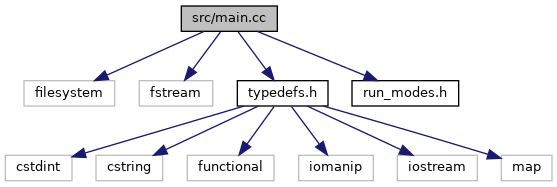This file processes the command line arguments, provides helper methods for processing the command line arguments, and decides what to run. More...
Include dependency graph for main.cc:

Macros | |
| #define | NO_ARGS 1 |
| The value of 'argc' if no arguments were passed on the command line. | |
| #define | NUM_COLUMNS (N_STATISTICS + 3) |
| The number of columns that appear in the output statistics. | |
| #define | CONFIG_LINE_SIZE (ARG_C_COUNT * 10) |
| The size of the config line buffer. | |
Functions | |
| void | exitIf (bool condition, std::string msg, uint32_t config_id, uint32_t arg_index) |
| Provide error message and exit code on condition. More... | |
| void | getConfig (int argc, char *argv[], cache_config &config) |
| Parse the given arguments into a memory system configuration. More... | |
| size_t | getTrace (int argc, char *argv[], std::ifstream &trace_file, int arg_max_count) |
| Open the trace file and read the trace limit. More... | |
| void | readConfigurations (std::vector< cache_config > &configs, char *configs_file_path) |
| Parse the cache configurations from the given configs file. More... | |
| void | printStatsHeader () |
| Print the header row in the statistics output CSV. | |
| void | usageMsg () |
| Print the program usage method. | |
| int | main (int argc, char *argv[]) |
| The main function decides which mode to execute based on the number of arguments supplied. More... | |
Variables | |
| std::map< std::string, coh_factory_t, ci_less > * | coherence_map = nullptr |
| A map from coherence protocol names to their factory functions. | |
| std::map< std::string, dir_factory_t, ci_less > * | directory_map = nullptr |
| A map from directory protocol names to their factory functions. | |
| std::map< std::string, rep_factory_t, ci_less > * | replacement_map = nullptr |
| A map from replacement policy names to their factory functions. | |
| constexpr const char * | stat_names [NUM_COLUMNS] |
| CSV-friendly names for cache runtime statistics. Make sure these match up with 'bus_msg_e' and 'statistic_e'. More... | |
Detailed Description
This file processes the command line arguments, provides helper methods for processing the command line arguments, and decides what to run.
Function Documentation
◆ exitIf()
| void exitIf | ( | bool | condition, |
| std::string | msg, | ||
| uint32_t | config_id, | ||
| uint32_t | arg_index | ||
| ) |
Provide error message and exit code on condition.
- Parameters
-
condition Whether the program should print an error message and exit msg The error message to print config_id The ID of the config that caused the error arg_index The argument of the config that caused the error
- See also
- Exit Codes
◆ getConfig()
| void getConfig | ( | int | argc, |
| char * | argv[], | ||
| cache_config & | config | ||
| ) |
Parse the given arguments into a memory system configuration.
- Parameters
-
argc The number of program arguments argv The array of program arguments config The configuration struct to populate
◆ getTrace()
| size_t getTrace | ( | int | argc, |
| char * | argv[], | ||
| std::ifstream & | trace_file, | ||
| int | arg_max_count | ||
| ) |
Open the trace file and read the trace limit.
- Parameters
-
argc The number of program arguments argv The array of program arguments trace_file An ifstream that will become the trace file arg_max_count The number of arguments when the trace limit argument is present
- Returns
- The trace limit
◆ main()
| int main | ( | int | argc, |
| char * | argv[] | ||
| ) |
The main function decides which mode to execute based on the number of arguments supplied.
- Parameters
-
argc The number of command line arguments argv An array to the command line arguments
- Returns
- The program exit code
- See also
- Exit Codes
◆ readConfigurations()
| void readConfigurations | ( | std::vector< cache_config > & | configs, |
| char * | configs_file_path | ||
| ) |
Parse the cache configurations from the given configs file.
- Parameters
-
configs The vector to contain the configurations configs_file_path The file path to the configs file
Variable Documentation
◆ stat_names
|
constexpr |
Initial value:
= {
"config", "core", "miss rate",
"processor reads", "processor writes",
"bus reads", "bus readxs", "bus updates", "bus upgrades", "bus writes",
"read misses", "write misses",
"line flushes", "line fetches", "c2c transfers", "write backs", "memory writes",
"evictions",
"exclusions", "interventions", "invalidations"
}
CSV-friendly names for cache runtime statistics. Make sure these match up with 'bus_msg_e' and 'statistic_e'.